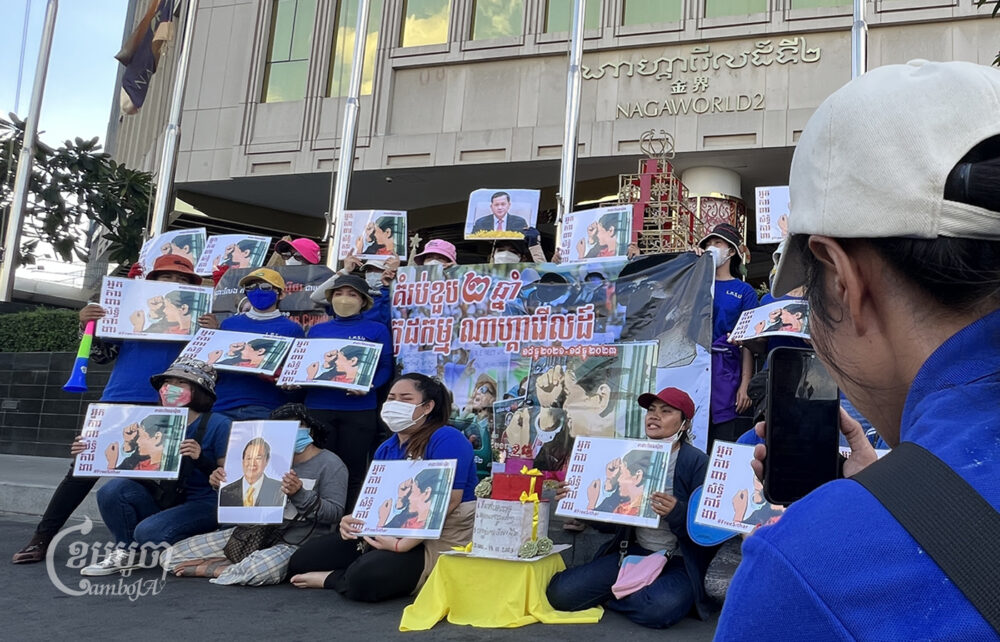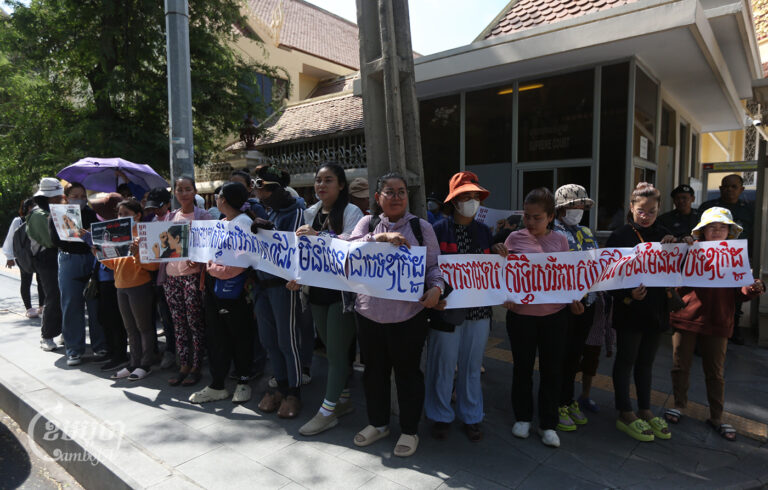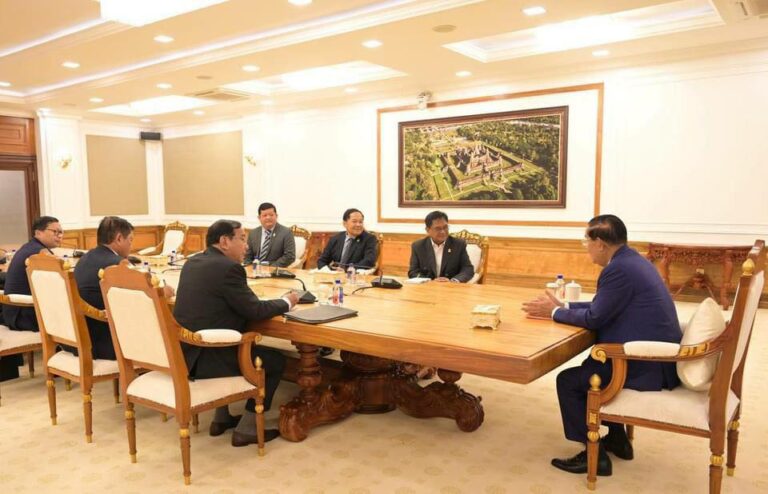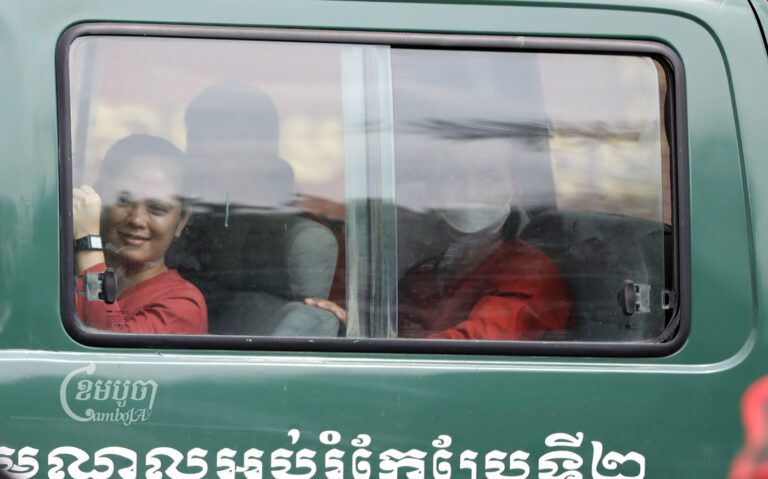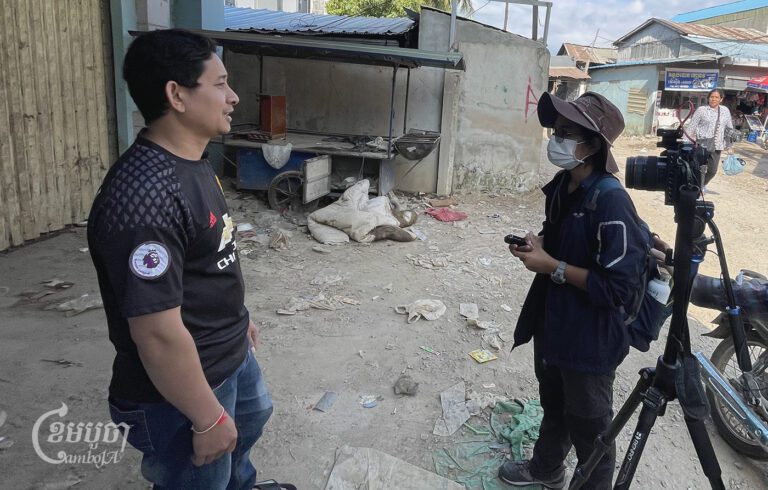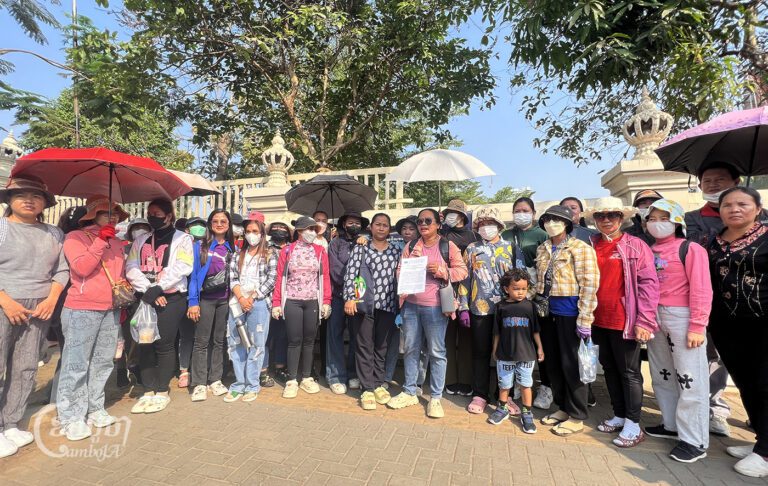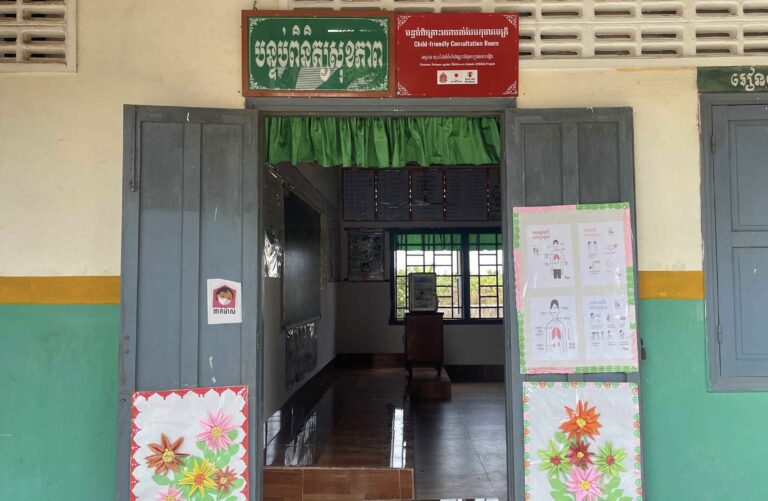For over two years now, NagaWorld strikers have been struggling to attain justice in their long-drawn labor dispute. But, their advocacy work in that time has only been met with injustice, including trumped-up criminal charges, arrests, violence, and harassment against women strikers. Despite this, they patiently wait for the light at the end of the tunnel.
On Monday at 2pm, about 30 workers gathered in front of the casino complex where they used to work, holding banners, hailers and microphones, while banging on drums and singing union songs to commemorate the second anniversary of their strike and to demand the government’s intervention to resolve the issue. They hope that the new government mandate would resolve the dispute, amid arrests and persecutions.
Pov Reaksmey, an intern at the casino, told CamboJA that she will never forget the “pain” of seeing the arrest of union leaders, violence and harassment against female strikers, and a few who suffered miscarriages. She said there was never any attention given on the issue by the relevant ministries, instead they were painted in a bad light, accusing them of starting a color revolution.
“I will never forget the injustice the authorities tried to suppress, in fact he [authority] came to protect NagaWorld bosses. Some of the strikers had injuries on their faces, while some suffered miscarriages,” Reaksmey recalled.
“I hope Naga’s new boss will address the nine points and the relevant ministries would apply the law because we deserve justice.” The nine points, which include the compensation of benefits and removal of the term “internship” for full-time work, were issued by the Labor Rights Supported Union of Khmer Employees of NagaWorld (LRSU) in 2021.
Reaksmey said the search for a solution has been protracted, negatively impacting strikers. Many face economic hardship as they do not have full-time jobs or regular wages and are burdened by family responsibilities. Some of them now work as waiters or pet carers to earn a living while continuing with advocacy work, hoping that the government will come up with an amicable solution.
“We seem to be fighting against time. We are under economic pressure. We look after people’s pets, wash dishes, clean houses and several other jobs to make money while continuing with the strike until a real solution is found,” Reaksmey said. “I don’t want to see the ministries practice double standards on us, because those who are protesting are the Cambodian citizens and what we are demanding is according to the labor law.”
The point of their struggle, she said, is to see terminated workers reinstated and for the LRSU to be recognized by NagaWorld. They also called for the release of LRSU head Chhim Sithar from prison as well as the dropping of charges against other strikers.
“The strike is not about the money, it is about the discrimination against independent unions. We want the LRSU to be present at NagaWorld,” Reaksmey said.
Another striker, Kheng Vichet, 34, who worked as a dealer for nearly 10 years with NagaWorld, said the delay in resolving labor disputes for workers has badly affected them as they wait for a solution in accordance with the law. “We now work part-time as waiters, construction workers or shopkeepers to earn a living while continuing to strike.”
As workers, they demand justice, not money, reminding the authorities that they are Cambodian workers who should be protected by the law.
“There used to be thousands of us striking but now there are fewer people because of the economic downturn,” Vichet said, adding that they are struggling to make ends meet, taking up small jobs to earn an income.
As such, he hoped that the new government would resolve their labor dispute and be able to return to work and continue advocating labor rights, which he feels is a matter of urgency and in accordance with the law.
“I hope the new government will find a suitable solution for us,” he said. “I struggle to this day because I want freedom for myself, my colleagues and all Cambodians. I want everyone to be respected, have rights at the workplace, good working conditions and dignity.”

Ministry of Labor and Vocational Training spokesperson Katta Orn told CamboJA that efforts have been made to mediate the NagaWorld strike as per their jurisdiction and role in the labor law, by using a dispute resolution mechanism. They mediated twice and have now referred the case to the Arbitration Council.
In accordance with the decision by the Arbitration Council, NagaWorld has “transferred the severance pay to the accounts of 373 former employees long ago”.
“The NagaWorld strikers’ protests are under the committee for the settlement of strikes and demonstrations,” he said. “The commission for resolving strikes and demonstrations in the target group has mediated 27 cases, but both sides have not been able to resolve the dispute.”
As of December 18, 2023, 287 out of 373 ex-employees accepted the severance pay and termination of employment contracts with the company. Apart from the remaining 86, who declined compensation as they want their jobs in the casino back but have found part time jobs in the interim, 20 persons continue to actively strike.
However, Orn believed that if the strikers and NagaWorld want to resolve the dispute, they can request the “Strike and Demonstration Committee” in their groups to reopen mediation. But, so far the committee for the settlement of strike and demonstration have not received any new request.
In an email to CamboJA, Human Rights Watch deputy Asia director Phil Robertson stressed that the main issue was that the NagaWorld management had “never engaged in sincere negotiations with the union”, and that the government has “done nothing to force them to do so”.
Instead, the administrators of NagaWorld relied on their “partners” in the government to “employ coercive tactics” to end the strike. These tactics, he alleged, consisted of intimidation, violation of labor rights, and detaining workers, who were peacefully protesting to be reinstated.
“The workers and their union should enjoy the right to freedom of association, protest, and strike, instead, government officials attacked them and imprisoned their leader,” Robertson said. “So, all the blame for the failure to resolve this dispute falls on the side of the NagaWorld management and the Cambodian government, especially the Labor Ministry – which has shown that it is far from neutral in this labor dispute.”
Robertson does not expect the new government to tackle the ongoing strike while NagaWorld’s strategy is to “play for time” and “wait till the striking workers get tired and give up their struggle”.
“So we do not expect they will change the government’s biased position against the workers’ strike” he said.
Chhim Sithar, NagaWorld union president was arrested violently by a group of plainclothes men in front of the Australian Embassy in January 2022 and charged with incitement along with other union members.
After being detained at the Second Correctional Center for two months, Sithar was released on bail in March 2022. However, she was re-arrested by immigration police as she returned from a labor rights conference in Australia for allegedly violating the terms of the bail on November 26, 2022.
On February 1, 2023, the US State Department announced that Sithar was among 10 recipients of the annual Human Rights Defenders Award.
Three months later on May 25, Phnom Penh Municipal Court judge Soeung Chakriya sentenced Sithar to two years’ imprisonment under Articles 494 and 495 of the Penal Code for “inciting unrest in society”.
Robertson found that the criminal charges against Sithar are a “politically-motivated joke” and serve to show the government’s alleged willingness to “weaponize the judicial system” against her and the other union leaders.
“It highlights how Cambodia’s ratifications of the various International Labor Organization [ILO] core conventions are a cruel ruse, and that the Labor Ministry and the government never intended to comply with those requirements,” he alleged.
Am Sam Ath, operation director of human rights group Licadho, said the resolution of a stalemate in the labor dispute is dependent on the will of the government. However, this is not happening for two reasons, he pointed out.
The first is related to the potential loss of control by NagaWorld if LRSU is allowed to exist in the company and second is to paint the strikers in a bad light to make the dispute worse, rather than resolve it using the labor law and union law.
Thus, Sam Ath urged the government and the ministry to consider resolving the dispute, because a prolongation would affect the workers’ livelihood. In addition, if the dispute is not resolved, workers may not have a union at their workplace, leading to bad working conditions, contrary to ILO convention. Furthermore, he said, the non-resolution would result in a negative perception of the government by the international community.
“I think the government should intervene and end this issue as a model [to resolving labor disputes],” Sam Ath remarked, adding that failure to resolve it would impact other sectors while investors may be put off by the lack of interest to protect workers or enforce the law.


